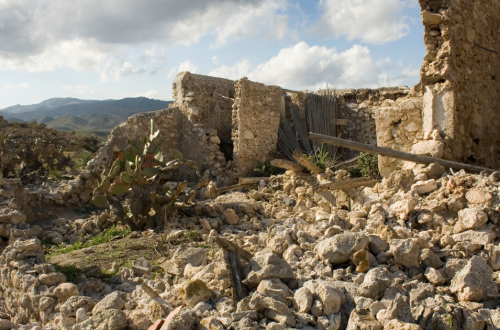
Ask: Finding Lessons in Suffering
When I was in the midst of an anxiety mess this fall, a dear friend sent me a podcast by preacher Charles Stanley that suggested I could ask God for His lessons in suffering, for His reason for my struggles. In other words, I could ask for clarity and understanding as well as healing so I would know what to bring out of my time of suffering.
I’ve thought a lot about that, about asking God questions. It’s one thing to ask for intervention—for healing, for a situation to change, for a blessing—but rarely do I ask God for understanding. For knowledge. So I thought I’d look into this.
First, I think it’s safe to say God doesn’t always let us know why we suffer, at least not the specifics. Generally, yes. There are reasons given in the Bible for suffering. Jesus suffered, so we suffer. Suffering brings about perseverance, character, and hope. (Rom. 5:3). Romans 8 says we share in Christ’s suffering so we may share in Christ’s glory. 2 Corinthians suggests those who suffer receive Christ’s comfort.
Hebrews 5 says Jesus learned obedience through suffering, so we can do the same. 1 Peter says suffering proves the genuineness of our faith and results in praise, glory, and honor when Jesus is revealed. Peter goes on to say we should rejoice in suffering, for we will then be overjoyed when Jesus’ glory is revealed. He promises that suffering ends with God restoring us and making us strong, firm, and steadfast.
Finally, in Revelation 2, John is told to write that those in Smyrna who suffer, even to the point of death, receive life as a reward.
You’re not alone
Suffering isn’t unique to anyone, but everyone’s personal suffering is unique, and that’s where Charles Stanley’s words come into play. This is where we can ask God for the details. Why this suffering? Why now? What does this suffering have to do with my relationship with God? What are the specific, personal lessons in my suffering? Is there anything here I need to carry forward?
Of course we cling to God to hold us. We ask, like Paul asked, that we remain strong, that we prove true and don’t buckle under suffering. And if we do buckle, we pray in perfect confidence that God is there to lift us up. He doesn’t stand ready to scold, rolling his eyes at my failure. No, talk to David, who failed God more than once, and see what he has to say about slipping in Psalm 38:15-17 or being lifted in 40:2:
Lord, I wait for you; you will answer, Lord my God. For I said, “Do not let them gloat or exalt themselves over me when my feet slip.” For I am about to fall, and my pain is ever with me. (Ps. 38) He lifted me out of the slimy pit, out of the mud and mire; he set my feet on a rock and gave me a firm place to stand. (Ps. 40)
David knew victory, and David knew failure, but whatever the outcome, he always came back to God and called on Him again and again.
Suffering as a call to prayer
I hate to admit it, but I cling to God better when life isn’t easy. I wish that wasn’t true, that I learned as many lessons from the great days as the rough days. No, it doesn’t need to be the deep, dark, life-shattering suffering of loss or death, but anytime my plans are derailed, I better see God’s plans. Maybe one day I’ll get to the place where I stop making so many plans of my own, after which I will never be derailed. If I always look to God and His plans, always expect difficulty because I am a child of a King hated by this world, I will never be startled or thrown by hard times.
Right now, I am not there. I get thrown. My desire to know peace and contentment on my terms is still strong. But God is working on me. And one way He works on me is through lessons that come from hardship. It only makes sense that I stop and figure out what some of those lessons are. That’s prayer, speaking with God expecting answers. And when I’m suffering, I talk to God often.
Your only job in the depths may be to tread water until better days come. Jesus called out in anguish, and so may you.
I talk to God more when I’m in trouble than when I’m not suffering, I’m afraid. But regardless, when I suffer, I know to call to God first, even if my calls start less than organized. When I am in the depths, it’s all I can do to reach out my hand and sputter for help. God knows this and is more than ready to offer his hand to catch me. That sputtering call for help is often accompanied by the first question of suffering: why.
The big WHY
It’s easy to cry out “WHY?” in the midst of suffering. Historically, those who suffer ask the same thing, including the psalmists and Jesus himself.
Three Psalms in a row ask the Why question. In Psalm 42-44, Israel is feeling God’s absence. In Psalm 42, the psalmist gets through the why question by remembering the good God had done in the past. One of the easiest traps I fall into during a hard time is the belief that this hardship has always been my life. When I was in the midst of anxiety, it felt like I’d never known peace.
So, the psalmist says, when I don’t know what you’re doing, God, I look to what you did in the past, and that restores my hope in the future.
In Psalm 43, the Psalmist says that when God finally leads him out of this suffering, he will rejoice and praise God. Looking past the end of the hard time helps when we ask why and don’t hear an immediate answer. This is temporary. There is something out there beyond this moment of suffering. And I will take advantage of it to show God my gratitude when it comes.
Then we have Psalm 44. It’s disturbing, to be honest, because Israel feels God has turned away for no reason. The psalmist asks God why, but the psalm concludes with no answer or hope. I think most of us have been there. Suffering without apparent reason hurts most of all, because it feels like betrayal.
The big takeaway? We ask why, but God doesn’t always answer. Not right away. But it’s okay to ask, and there are things to see while we ask that will lead us to better understanding later. How am I sure it’s okay to ask? Because Jesus did it.
Even Jesus
Jesus asked the why from the cross, using words from the Psalms themselves. Why have you forsaken me, God? I’m pretty sure Jesus knew the answer. His entire life pointed to this single purpose, his suffering used to restore mankind to God, and yet in the heart of the agony, it is natural to ask why, to need a reminder of the goals. Did Jesus ask having truly forgotten, even for a moment, or did he ask so we will feel comfortable calling to God in our anguish? I don’t know, but I do know if Jesus can call out why, then I can call out why. And if God can not answer Jesus in any obvious, tangible way, then He can respond to me just the same.
I bet you’ve been there, felt like God’s hand was pressing down, like the world had suddenly gotten stronger and God weaker, or that God didn’t care or notice what was happening, and you’ve called out why and gotten no answer.
Or have you?
Beyond the Why
This is where we need to know our Bible. Write down your journey. Look for God’s lessons along the way. After Jesus’ resurrection, he walked with two men down a road and explained to them everything the Bible had to say about Jesus and the road of suffering he had to walk. Have you ever done that, written out your path and why things happened? Because in the midst of it you may not see it, but at the end, or during quiet moments, God calls us to understand, to look at suffering with God’s eyes and not the eyes of men.
The formal term is reframing, and Paul gives us an example of this in 2 Corinthians. He calls on God to remove a thorn from his flesh. We don’t know the specifics, but whatever Paul suffered, he wanted it gone. God said no.
What interests me about this passage is that Paul understood why he suffered. He says in verse seven that God gave him a thorn to keep him from becoming conceited. That seems like a good reason, a nice, spiritual reason for suffering. But Paul doesn’t say he was happy about it. No, he says he pleaded with God to remove it.
It isn’t until God reiterates the reason that Paul accepts God’s plan for his suffering. I am enough for you, God says. My power shines when yours diminishes. It was after this that Paul accepted his suffering, even relished it. God allowed Paul to reframe the suffering and to understand the why. Not the specifics of the why, or not that we’re told, but the big picture. All those reasons I gave above—Paul really saw and understood those and accepted that God’s plans for him were the best plans.
Even more, because of Paul’s understanding of God, the reason that swayed him the most was that God’s power would shine through Paul’s weakness. If you’ve read any of Paul’s writing you see that Paul was all about God’s power and glory and honor, and he longed to see everyone in the world understand it. To think that his suffering worked toward this goal of his heart was enough for him.

Lessons learned
What have you learned through suffering? You may never get an answer to your specific whys. In the midst of it, you may do nothing more than hang on, calling to God like a child crying for his mother, and that’s okay. God is there to lift you up. He promises to restore you. Your only job in the depths may be to tread water until better days come. Jesus called out in anguish, and so may you.
But at some point you will have the opportunity to look deeper and to ask better questions. What did I learn about God through my hardship? How has this led me to obey God more? To trust Jesus more? Has my view of God and the world changed because of this time? Is there something here God wants me to carry forward? If I walk down the road with my friends, what can I say about the big picture of my life and what my suffering has done for me and others?
My personal answers
I’ll answer some of this for myself. I lost most of fall 2022 experiencing panic attacks, enduring more than one per day. I suffered body and soul exhaustion.
Then God said that time was over. He led me to a doctor who discovered the root of my personal suffering was physical—I was anemic, and the symptoms of anemia look a lot like anxiety, and they triggered panic. Fix the anemia, and many of the panic triggers went away. I was fortunate to be given restoration in this world. Not everyone gets that, so I am very grateful to be given such a gift.
Is it all the way gone? No. I still feel fragile, to be honest. But it’s better, and I can function again, so I’m happy.
So what did I learn? During that time God led me to a book by Louie Giglio about resisting temptation and taking my thoughts under control, and those lessons will stick. I recognize the way my feet personally slip and what draws my thoughts away from God, which better equips me should I fall this way again.
I also learned about community, because the truth is I’d put off collecting people to be on my side when trouble hit, and those three months were crazy lonely. That’s something I am working on, trying to collect those who wish to walk with me—and who wish my company at their side—so we can hold onto each other when the floods come.
I don’t know why God chose fall of 2022 to send suffering. I don’t know the deep whys, and yes, there were moments I felt betrayed and alone, when Satan whispered lies and I listened. But for the most part I reached out my hand, and God put me on a rock. When I dried out and caught my breath, He let me see answers to the more important questions than that panicked why. He let me know what to take forward and how to do better when struggles come around again.
Ask
Simply ask. Ask God what He wants you to remember when suffering comes. What lessons have you learned? How can this time of hardship prepare you for others? Or does it teach you lessons you are to share with others? Sure, it’s okay to call out why from the depths, but there are other questions to ask when the struggles subside, things to carry forward.
I’m not yet Paul who seems to delight in struggles. I’d be perfectly content never to struggle again. But that won’t be the case, and I hope I’ve asked the right questions to solidify in my mind some of the lessons God has for me so I can move forward with more confidence and hope than where I started a few months ago.
What lessons have you learned through hard times? I’d love to hear your stories and how God answered your questions during struggles.




